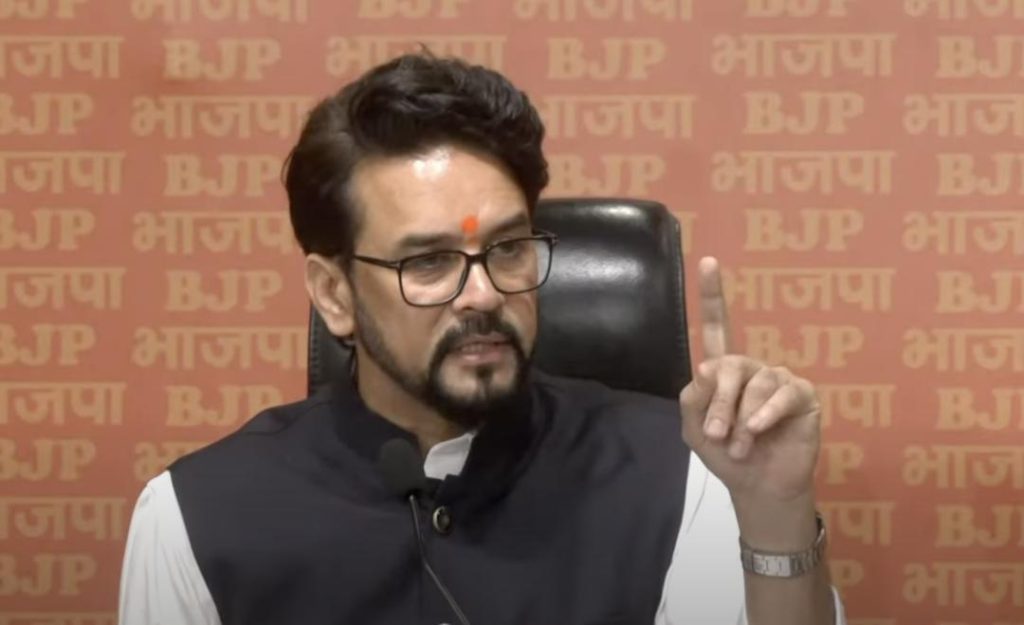
Congress & CPI made Bhimrao Ambedkar lose the poll in 1952: BJP
The Indian political landscape has witnessed numerous significant events and controversies over the years. One such incident that has recently gained attention is the alleged manipulation of the 1952 election results, which led to the defeat of Dr. Bhimrao Ambedkar, the architect of the Indian Constitution. BJP MP Anurag Thakur has made some shocking claims, stating that the Congress party, along with the Communist Party of India (CPI), conspired to defeat Dr. Ambedkar in the election.
In a recent speech, Anurag Thakur claimed that the Congress party laid the foundation of electoral corruption in the very first election of 1952. He stated that the party, along with the CPI, worked together to defeat Dr. Ambedkar, a constitution maker and a saint-like leader. According to Thakur, 74,333 votes were rejected in the election, which he believes was a deliberate attempt to discredit Dr. Ambedkar’s candidacy.
Dr. Bhimrao Ambedkar was a prominent figure in India’s fight for independence and a key player in the drafting of the Indian Constitution. He was also a strong advocate for the rights of the Dalit community, and his leadership was instrumental in the formation of the Scheduled Castes Federation. Despite his significant contributions to Indian politics, Dr. Ambedkar’s defeat in the 1952 election was a significant blow to his political career.
Thakur’s allegations have raised several questions about the fairness of the election and the role of the Congress party in Dr. Ambedkar’s defeat. The rejection of 74,333 votes is a staggering number, and Thakur’s claim that this was a deliberate attempt to discredit Dr. Ambedkar’s candidacy is a serious accusation.
The 1952 election was a significant milestone in Indian politics, marking the country’s transition from British colonial rule to democratic governance. The election saw the rise of several prominent political parties, including the Congress party, which had been a dominant force in Indian politics since the country’s independence.
However, the election was marred by allegations of fraud and irregularities, which led to the rejection of a significant number of votes. The rejection of votes was largely attributed to technical issues, such as invalid ballots, and the failure of voters to follow the proper voting procedures.
Despite these issues, the Congress party emerged as the single largest party in the election, winning 364 seats in the Lok Sabha. The party’s victory was seen as a testament to its strong organizational structure and its ability to mobilize voters across the country.
However, Thakur’s allegations suggest that the Congress party’s victory was not solely due to its electoral strength. He claims that the party, along with the CPI, conspired to defeat Dr. Ambedkar and discredit his candidacy. This claim raises several questions about the fairness of the election and the role of the Congress party in Dr. Ambedkar’s defeat.
Dr. Ambedkar’s defeat in the 1952 election was a significant setback for his political career. He had been a key player in the drafting of the Indian Constitution and had played a crucial role in the formation of the Scheduled Castes Federation. His defeat was seen as a blow to the Dalit community, which had been a significant beneficiary of his leadership.
Despite his defeat, Dr. Ambedkar continued to play a significant role in Indian politics. He was a vocal critic of the Congress party and its policies, and he continued to advocate for the rights of the Dalit community. His legacy has endured long after his death, and he remains an important figure in Indian politics and society.
The allegations made by Anurag Thakur have sparked a renewed interest in the 1952 election and the role of the Congress party in Dr. Ambedkar’s defeat. The controversy has raised several questions about the fairness of the election and the role of the Congress party in Indian politics.
In conclusion, the allegations made by Anurag Thakur regarding the 1952 election and Dr. Bhimrao Ambedkar’s defeat are serious and warrant further investigation. The rejection of 74,333 votes is a staggering number, and the claim that this was a deliberate attempt to discredit Dr. Ambedkar’s candidacy is a serious accusation. The Congress party’s victory in the election has been questioned, and the party’s role in Dr. Ambedkar’s defeat has been the subject of much speculation.
As we reflect on the 1952 election and its significance in Indian politics, it is essential to consider the allegations made by Thakur and the implications they have for our understanding of the election. The controversy has raised several questions about the fairness of the election and the role of the Congress party in Indian politics. It is only by examining these questions and seeking the truth that we can move forward and build a more just and equitable society.
Source: https://youtu.be/0kLyW5rSJSg






